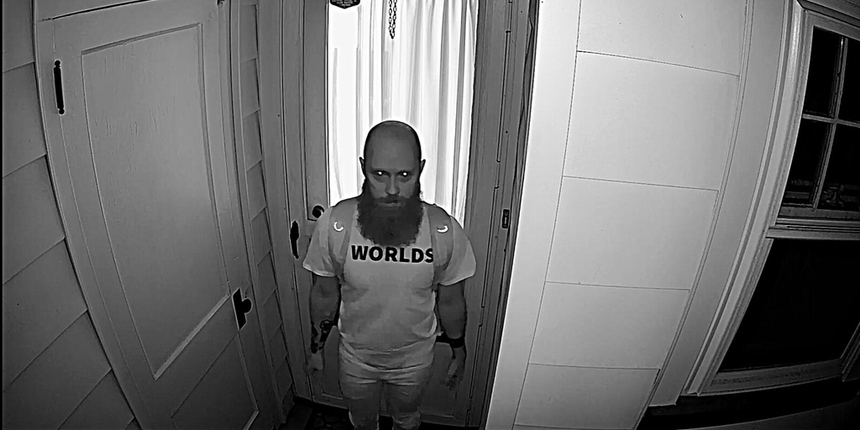Panic Fest 2024 Review: WORLDS Asks a Lot of Questions, Offers No Answers

Like its fellow found footage/mockumentary and Panic Fest 2024 film Jeffrey’s Hell, Worlds begins with an interview. Morgan Williams (Nikki Neurohr) talks about how she and some friends began to see a strange man (Nick Dailey), who always wore all white and a shirt with WORLDS written on it, around doing odd things. He’d stare into streetlights as if they were communicating with him, he’d stand perfectly still in the middle of an empty parking lot, he’d move in ways that were somewhere between flailing, yoga, and modern dance.
Morgan and her friends began to film the man, who they named Worlds because of his shirt, and send each other the short videos. They didn’t post them publicly and never approached Worlds so they didn’t see the harm in their surveillance activities. But then Worlds started to appear closer to the places Morgan frequented, and before long he appeared in her neighborhood. She explains that in the past she had experiences with stalking so she called the police.
Shortly after that call, Worlds was found dead, cleanly decapitated with his headless body left in a street, perfectly perpendicular to the lines of traffic. That murder is the genesis of the film we’re seeing. Director Chris Hammarberg and his small crew want to talk to everyone they can that came into contact with Worlds, and do their best to solve his murder.
We see interviews with Morgan, a friend of hers, the policeman who responded to her call, the man who found Worlds’s body, and an investigative journalist. Through these testimonies the film builds a compelling mystery about who, or what, Worlds was, where he came from, and what all of his odd activities meant.
There’s nothing explicitly horrifying about anything in the footage of Worlds taken by Morgan and her friends, nor is any of what the others say particularly scary. The sequence of the police response to Morgan’s call is a wonderfully tense piece of found footage filmmaking that splices together the recordings from the cop’s body camera and exterior home security cameras, but it’s not exactly frightening. It’s simply unnerving, and the more answers we get about Worlds, the more questions arise.
Partway through the film, Jonathan Fischer (John R. Smith Jr.), who found Worlds’s body, tells a story that expands its scope in a matter of minutes from an investigation into a strange local phenomenon to something that may be a national conspiracy. A conspiracy that’s seemingly confirmed when James Navarro (Lorenzo Beronilla), the officer who came to Morgan’s aid when Worlds got too close, confirms by shutting down an interview.
Yet the film doesn’t expand, it just shifts its focus as one of the interview subjects disappears. The mystery of Worlds’s death is eschewed in favor of the more immediate questions of what has happened to the former participant in the film and whether it had anything to do with the film itself.
None of these questions are answered. But what’s remarkable is that Worlds flips its audience’s priorities as it goes on. The crew’s lofty goal of solving a murder looks more arrogant than admirable when they’ve likely caused someone harm by searching for answers powerful people don’t want found. In a scene late in the film, they arrive unannounced on a former talking head’s doorstep after several unanswered calls, and accost the person when they emphasize that the calls went unanswered because they don’t want to talk to the filmmakers anymore.
These developments and scenes make the filmmakers less audience avatars in an exciting story, and more uncaring content creators. It’s a move that makes Worlds’ refusal to give viewers any answers a feature instead of a bug.
In place of answers to the many intriguing questions it poses about Worlds and his death, the film forces us to reconsider it as an exploration of themes rather than an investigation into a mystery. It can be considered in regards to surveillance, the explosion of true crime media and its impact on empathy, spoken and unspoken boundaries, and more. It’s a found footage/mockumentary movie that doesn’t offer scares or a mystery with a satisfying conclusion, but succeeds as a matter of fact look at the world we live in through a (perhaps) fantastical lens.







